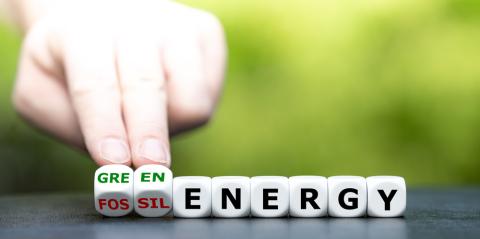European Economic
and Social Committee
EESC says secure and affordable energy supply is a priority
The European Economic and Social Committee (EESC) throws its support behind the Commission's "REPowerEU" initiative, stressing that energy security must be accompanied by urgent measures to protect vulnerable users, accelerate decarbonisation and diversify energy sources. Steps should also be taken to reduce demand for Russian gas which has brought about a significant increase in energy prices.
Energy independence is key for Europe's future and so the EU needs to secure its energy supplies as soon as possible, breaking free of Russian gas and drastically accelerating the transition to clean energy. This is the main takeaway of the opinion on "REPowerEU: Joint European Action for more affordable, secure and sustainable energy", drafted by Thomas Kattnig, Alena Mastantuono and Simo Tiainen and adopted at the May plenary session.
The EESC backs the European Commission's communication "REPowerEU", approved by the College on the same day as the opinion, saying that it matches the objectives of the Green Deal and the European Energy Union. In addition, the proposal sets out new actions to ramp up the production of green energy, diversify supplies and reduce demand for Russian gas which has led to significant increases in electricity market prices due to market manipulation.
The Committee also warns that the EU must be particularly cautious when it comes to replacing Russian gas with other resources, because of their environmental impact as well as the prospect of becoming newly dependent on third countries which do not share European values.
Protecting consumers and businesses from high energy prices
The current geopolitical situation caused by the Russian invasion of Ukraine has further worsened the unprecedented surge in energy prices the EU has faced in the past few months. It is therefore extremely important to take immediate steps to mitigate the impact of high prices for European households, farmers, businesses and industry.
In order to offset the price pressures consumers are experiencing at the moment, the EESC points out that Member States will need to adopt fiscal or regulatory measures to avoid sudden price increases, secure affordable prices for end consumers and prevent energy poverty, and urges the Commission and the Council to take further action to stabilise prices in the EU's energy system.
Nevertheless, EU and national policymakers should ensure that any measures do not hamper the functioning of the internal energy market, do not jeopardise decarbonisation and energy efficiency efforts and do not cause investment uncertainties in the energy industry. Moreover, they should be decided in close consultation with the relevant stakeholders, e.g. the social partners.
We demand short-term solutions in line with the objectives of the Green Deal and the Energy Union to secure more affordable, secure and sustainable energy, and a massive effort to increase green energy production, diversify supply and reduce demand to increase energy-independency from Russia,
said Mr Kattnig.
Facilitating investment in low-carbon solutions
High energy prices lead to high profits for many oil companies, as well as some energy suppliers and traders. The International Energy Agency estimates these so-called "windfall profits" in the EU at around EUR 200 billion in 2022 and proposes that these profits be skimmed off with the help of taxes and redistributed as financial compensation to energy consumers and used for the expansion of renewable energy production and the necessary grid infrastructure. However, "windfall taxes" must be handled with care: they can be problematic and discourage investments by energy companies in low-carbon solutions.
Ms Mastantuono warned that the situation is very serious, we have to activate all energy sources at our disposal and ensure a great level of solidarity and trust among Member States in order to secure energy supply for all Europeans.
Tapping into the potential of all clean energy sources
Infrastructure is therefore crucial and needs to be enhanced in order to accommodate the switch to the green transition in line with Green Deal goals and also to diversified gas sources, while at the same time ensuring the flow of energy among Member States via transmission interconnections.
Security of energy supplies also means a versatile energy production palette, making the most not only of wind and solar power, but also of a wide variety of other low-carbon energy sources that fit economically and ecologically within an energy system. Until the EU's energy diversification has been completed, the EESC is in favour of using, from a practical point of view, stable and affordable energy sources that meet the low-carbon requirements, and urges the Commission to put forward a detailed action plan aimed at enhancing biogas production.
The "REPowerEU" communication indicates that biomethane production should be boosted to 35 bcm by 2030. Mr Tiainen highlighted that this goal is very ambitious and welcome, but concrete measures and incentives have to be adopted to achieve it. Energy availability, security and affordability are challenging issues that need to be dealt with quickly, in this way we will also move towards meeting our climate objective
.
Work organisation
Downloads
-
REPowerEU
